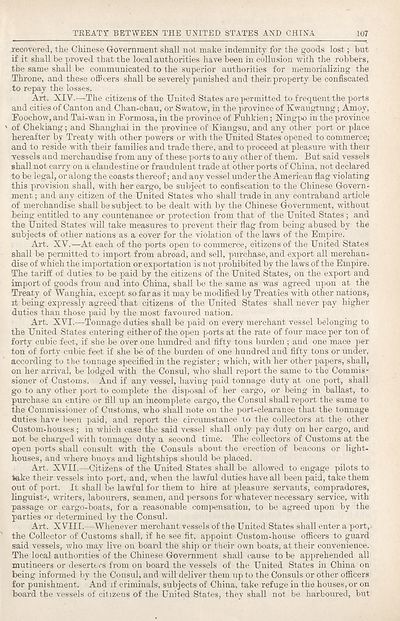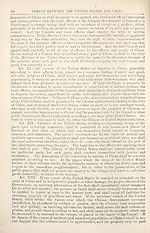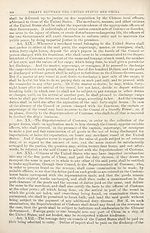1918
(175) Page 107
Download files
Complete book:
Individual page:
Thumbnail gallery: Grid view | List view

TREATY BETWEEN THE UNITED STATES AND CHINA
107
recovered, the Chinese Government shall not make indemnity for the goods lost; but
if it shall be proved that the local authorities have been in collusion with the robbers,
the same shall be communicated to the superior authorities for memorializing the
Throne, and these officers shall be severely punished and their property be confiscated
to repay the losses.
Art. XIY.—The citizens of the United States are permitted to frequent the ports
and cities of Canton and Chan-chau, or Swatow, in the province of Kwangtung; Amoy,
Foochow, and Tai-wan in Formosa, in the province of Fuhkien; Ningpo in the province
of Chekiang; and Shanghai in the province of Kiangsu, and any other port or place
hereafter by Treaty with other powers or with the United States opened to commerce;
and to reside with their families and trade there, and to proceed at pleasure with their
•vessels and merchandise from any of these ports to any other of them. But said vessels
shall not carry on a clandestine or fraudulent trade at other ports of China, not declared
to be legal, or along the coasts thereof; and any vessel under the American flag violating
this provision shall, with her cargo, be subject to confiscation to the Chinese Govern¬
ment ; and any citizen of the United States who shall trade in any contraband article
of merchandise shall be subject to be dealt with by the Chinese Government, without
being entitled to any countenance or protection from that of the United States; and
the United States will take measures to prevent their flag from being abused by the
subjects of other nations as a cover for the violation of the laws of the Empire.
Art. XY.—At each of the ports open to commerce, citizens of the United States
shall be permitted to import from abroad, and sell, purchase, and export all merchan¬
dise of which the importation or exportation is not prohibited by the laws of the Empire.
The tariff of duties to be paid by the citizens of the United States, on the export and
import of goods from and into China, shall be the same as was agreed upon at the
Treaty of Wanghia, except so far as it may be modified by Treaties with other nations,
it being expressly agreed that citizens of the United States shall never pay higher
duties than those paid by the most favoured nation.
Art. XVI.—Tonnage duties shall be paid on every merchant vessel belonging to
the United States entering either of the open ports at the rate of four mace per ton of
forty cubic feet, if she be over one hundred and fifty tons burden; and one mace per
ton of forty cubic feet if she be of the burden of one hundred and fifty tons or under,
according to the tonnage specified in the register; which, with her other papers, shall,
on her arrival, be lodged with the Consul, who shall report the same to the Commis¬
sioner of Customs. And if any vessel, having paid tonnage duty at one port, shall
go to any other port to complete the disposal of her cargo, or being in ballast, to
purchase an entire or fill up an incomplete cargo, the Consul shall report the same to
the Commissioner of Customs, who shall note on the port-clearance that the tonnage
duties have been j)aid, and report the circumstance to the collectors at the other
Custom-houses; in which case the said vessel shall only pay duty on her cargo, and
not be charged with tonnage duty a second time. The collectors of Customs at the
open ports shall consult with the Consuls about the erection of beacons or light¬
houses, and where buoys and lightships should be placed.
Art. XVII.—Citizens of the United States shall be allowed to engage pilots to
take their vessels into port, and, when the lawful duties have all been paid, take them
out of port. It shall be lawful for them to hire at pleasure servants, compradores,
linguist-', writers, labourers, seamen, and persons for whatever necessary service, with
passage or cargo-boats, for a reasonable compensation, to be agreed upon by the
parties or determined by the Consul.
Art. XVIII.—Whenever merchant vessels of the United States shall enter a port,
the Collector of Customs shall, if he see fit, appoint Custom-house officers to guard
said vessels, who may live on board the ship or their own boats, at their convenience.
The local authorities of the Chinese Government shall cause to be apprehended all
mutineers or deserters from on board the vessels of the United States in China on
being informed by the Consul, and will deliver them up to the Consuls or other officers
for punishment. And if criminals, subjects of China, take refuge in the houses, or on
board the vessels of citizens of the United States, they shall not be harboured, but
107
recovered, the Chinese Government shall not make indemnity for the goods lost; but
if it shall be proved that the local authorities have been in collusion with the robbers,
the same shall be communicated to the superior authorities for memorializing the
Throne, and these officers shall be severely punished and their property be confiscated
to repay the losses.
Art. XIY.—The citizens of the United States are permitted to frequent the ports
and cities of Canton and Chan-chau, or Swatow, in the province of Kwangtung; Amoy,
Foochow, and Tai-wan in Formosa, in the province of Fuhkien; Ningpo in the province
of Chekiang; and Shanghai in the province of Kiangsu, and any other port or place
hereafter by Treaty with other powers or with the United States opened to commerce;
and to reside with their families and trade there, and to proceed at pleasure with their
•vessels and merchandise from any of these ports to any other of them. But said vessels
shall not carry on a clandestine or fraudulent trade at other ports of China, not declared
to be legal, or along the coasts thereof; and any vessel under the American flag violating
this provision shall, with her cargo, be subject to confiscation to the Chinese Govern¬
ment ; and any citizen of the United States who shall trade in any contraband article
of merchandise shall be subject to be dealt with by the Chinese Government, without
being entitled to any countenance or protection from that of the United States; and
the United States will take measures to prevent their flag from being abused by the
subjects of other nations as a cover for the violation of the laws of the Empire.
Art. XY.—At each of the ports open to commerce, citizens of the United States
shall be permitted to import from abroad, and sell, purchase, and export all merchan¬
dise of which the importation or exportation is not prohibited by the laws of the Empire.
The tariff of duties to be paid by the citizens of the United States, on the export and
import of goods from and into China, shall be the same as was agreed upon at the
Treaty of Wanghia, except so far as it may be modified by Treaties with other nations,
it being expressly agreed that citizens of the United States shall never pay higher
duties than those paid by the most favoured nation.
Art. XVI.—Tonnage duties shall be paid on every merchant vessel belonging to
the United States entering either of the open ports at the rate of four mace per ton of
forty cubic feet, if she be over one hundred and fifty tons burden; and one mace per
ton of forty cubic feet if she be of the burden of one hundred and fifty tons or under,
according to the tonnage specified in the register; which, with her other papers, shall,
on her arrival, be lodged with the Consul, who shall report the same to the Commis¬
sioner of Customs. And if any vessel, having paid tonnage duty at one port, shall
go to any other port to complete the disposal of her cargo, or being in ballast, to
purchase an entire or fill up an incomplete cargo, the Consul shall report the same to
the Commissioner of Customs, who shall note on the port-clearance that the tonnage
duties have been j)aid, and report the circumstance to the collectors at the other
Custom-houses; in which case the said vessel shall only pay duty on her cargo, and
not be charged with tonnage duty a second time. The collectors of Customs at the
open ports shall consult with the Consuls about the erection of beacons or light¬
houses, and where buoys and lightships should be placed.
Art. XVII.—Citizens of the United States shall be allowed to engage pilots to
take their vessels into port, and, when the lawful duties have all been paid, take them
out of port. It shall be lawful for them to hire at pleasure servants, compradores,
linguist-', writers, labourers, seamen, and persons for whatever necessary service, with
passage or cargo-boats, for a reasonable compensation, to be agreed upon by the
parties or determined by the Consul.
Art. XVIII.—Whenever merchant vessels of the United States shall enter a port,
the Collector of Customs shall, if he see fit, appoint Custom-house officers to guard
said vessels, who may live on board the ship or their own boats, at their convenience.
The local authorities of the Chinese Government shall cause to be apprehended all
mutineers or deserters from on board the vessels of the United States in China on
being informed by the Consul, and will deliver them up to the Consuls or other officers
for punishment. And if criminals, subjects of China, take refuge in the houses, or on
board the vessels of citizens of the United States, they shall not be harboured, but
Set display mode to:
![]() Universal Viewer |
Universal Viewer | ![]() Mirador |
Large image | Transcription
Mirador |
Large image | Transcription
Images and transcriptions on this page, including medium image downloads, may be used under the Creative Commons Attribution 4.0 International Licence unless otherwise stated. ![]()
| Asian directories and chronicles > 1918 > (175) Page 107 |
|---|
| Permanent URL | https://digital.nls.uk/194895605 |
|---|
| Attribution and copyright: |
|
|---|---|
| Description | Volumes from the Asian 'Directory and Chronicle' series covering 1917-1941, but missing 1919 and 1923. Compiled annually from a multiplicity of local sources and research. They provide listings of each country's active corporations, foreign residents and government agencies of all nationalities for that year, together with their addresses. Content includes: various treaties; coverage of conflicts; currencies and taxes; consular fees; weights and measures; public holidays; festivals and traditions. A source of information for both Western states and communities of foreigners living in Asia. Published by Hongkong Daily Press. |
|---|---|
| Shelfmark | H3.86.1303 |
| Additional NLS resources: |

